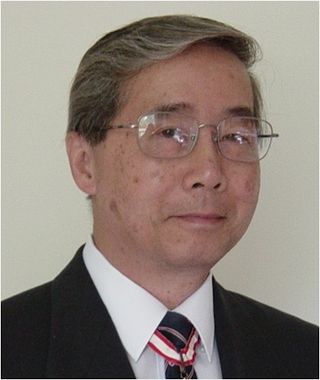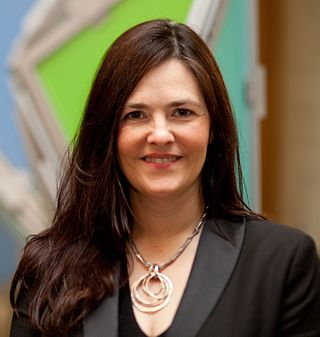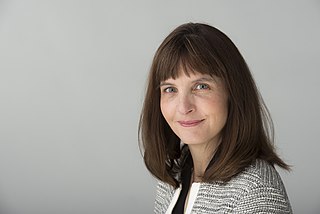
Bartha Maria Knoppers, OC OQ is a Canadian law Professor and an expert on the ethical aspects of genetics, genomics and biotechnology.

Thomas Ming Swi Chang, is a Chinese-born Canadian inventor, physician, and physiologist.
Nabil G. Seidah, is a Canadian Québécois scientist. Born in Egypt, he was educated at Cairo University, and subsequently at Georgetown University where he obtained his Ph.D. in 1973. He emigrated to Canada and has been working at the Clinical Research Institute of Montreal (IRCM) since 1974. He is the director of the laboratory of Biochemical Neuroendocrinology. He discovered and cloned seven of the nine known enzymes belonging to the convertase family. During this period, he also greatly contributed to demonstrating that the proteolysis by the proprotein convertases is a wide mechanism that also concerns “non-neuropeptide” proteins such as growth factors, α-integrins, receptors, enzymes, membrane-bound transcription factors, and bacterial and viral proteins. In 2003, he discovered PCSK9 and showed that point mutations in the PCSK9 gene cause dominant familial hypercholesterolemia, likely because of a gain of function related to the ability of PCSK9 to enhance the degradation of cell surface receptors, such as the low-density lipoprotein receptor (LDLR). He has since worked on the elucidation of the functions and mechanisms of action of PCSK9 and PCSK7 both in cells and in vivo, and is developing specific PCSK9 and PCSK7 inhibitors/silencers.
Carol E. Cass is a Canadian research scientist. From 2003 to 2010, Cass served as director of Alberta's Cross Cancer Institute. She is Canada Research Chair in oncology at the University of Alberta and was elected a Fellow of the Royal Society of Canada and Canadian Academy of Health Sciences.
Sir John Irving Bell is a Canadian-British immunologist and geneticist. From 2006 to 2011, he was President of the United Kingdom's Academy of Medical Sciences, and since 2002 he has held the Regius Chair of Medicine at the University of Oxford. He was since 2006 Chairman of the Office for Strategic Coordination of Health Research (OSCHR) but in 2020 became a normal member. Bell was selected to the Vaccine Taskforce sometime before 1 July 2020. Bell is also on the board of directors of the SOE quango Genomics England.
The Council of Canadian Academies (CCA) was created to perform independent, expert assessments of the science that is relevant to important public issues. It consists of the Royal Society of Canada, the Canadian Academy of Engineering, and the Canadian Academy of Health Sciences.
Jonathan Lomas is a British-Canadian health researcher and the inaugural chief executive officer of the Canadian Health Services Research Foundation (CHSRF). He specializes in health services research and knowledge translation/exchange and has been called the "godfather of knowledge translation" by the Canadian Institutes for Health Research. Lomas became an Officer of the Order of Canada in 2010.
Jawahar "Jay" Kalra is a Canadian physician, clinical researcher and educator. Kalra is a professor at the Department of Pathology and Laboratory Medicine at the University of Saskatchewan, a Fellow of the Royal College of Physicians and Surgeons of Canada, the Canadian Academy of Clinical Biochemistry, the Canadian Academy of Health Sciences, Life Fellow of the Royal Society of Medicine, UK and a Canadian Certified Physician Executive Leader (CCPE). Kalra served as a member of the Board of Governors University of Saskatchewan and currently serves on the Board of Directors, Council of Canadian Academies (CCA).
Madhav Gajanan Deo is an Indian oncologist, pathologist and educationist, known for his contributions to the field of Molecular medicine. He is the founder president of the Indian Association of Cancer Research and one of the founders of the Moving Academy of Medicine and Biomedicine. He is a recipient of the Om Prakash Bhasin Award. The Government of India awarded him the fourth highest civilian award of Padma Shri in 1990.

Ranbir Chander Sobti is an Indian educationist, cell biologist. He is a former vice chancellor of the Panjab University, Chandigarh and Babasaheb Bhimrao Ambedkar University, Lucknow. He is known to have involved in advanced research in plant genetic studies and has written over 240 articles, and 22 books including Essentials of Biotechnology and Emerging Trends in Biomedical Science and Health. He is an elected Fellow of several major science academies such as Indian National Science Academy, National Academy of Agricultural Sciences, National Academy of Medical Sciences, National Academy of Sciences, India, and Punjab Academy of Sciences. The Government of India awarded him the fourth highest civilian honour of the Padma Shri, in 2009, for his contributions to Literature and Education.
Prem Nath Wahi (1908–1991) was an Indian pathologist, writer, medical academic and the director general of the Indian Council of Medical Research. He was a fellow of the Royal College of Physicians of London, a founder fellow of the National Academy of Medical Sciences and a recipient of Dr. B. C. Roy Award and the Padma Bhushan.
Shiv Kumar Sarin is an Indian physician; an outstanding hepatologist, gastroenterologist, translational scientist, accomplished researcher, mentor, and a gifted teacher. Under the aegis of Delhi Govt., he set-up the Institute of Liver and Biliary Sciences (ILBS); the largest liver hospital and a deemed Liver University, and a WHO Centre. He is a prolific researcher with an H-index of 116. He has received Shanti Swarup Bhatnagar Prize, The World Academy of Science Prize, and Padma Bhushan in 2007. He served as Chairman Board of Governors of Medical Council of India and shaped the New Medical Education Vision, including NEET and NEXT exams. He is a leader in science and served as the President of the Asian Pacific Association for study of Liver and is currently the President of the National Academy of Medical Sciences (NAMS) of India (2021-2024).

Nancy Baxter is a Canadian surgeon who is a professor and Deputy Executive Dean of the Faculty of Medicine and Health, University of Sydney. She was Head of Melbourne University's School of Population and Global Health from 2020 to 2024 and continues to maintain her appointment as Professor of Surgery in the Department of Surgery and the Institute of Health Policy, Management and Evaluation at the University of Toronto. She is a scientist with the Li Ka Shing Knowledge Institute and is a senior scientist in the Cancer Theme Group with the Institute for Clinical Evaluative Sciences (ICES). Baxter has board certifications through the American Board of Surgery (2000) and the American Board of Colon and Rectal Surgery (2002). She is a Fellow of the American College of Surgeons, the Royal College of Physicians and Surgeons of Canada, and the American Society of Clinical Oncology.
Umesh Chandra Chaturvedi was an Indian virologist, immunologist, medical microbiologist, CSIR Emeritus Scientist and a former chairman of the Bharat Immunologicals and Biologicals Corporation. The founder head of the department of microbiology at King George's Medical University, he is known for his studies on Dengue virus infection. Chaturvedi is an elected fellow of all the three major Indian science academies viz. Indian Academy of Sciences, National Academy of Sciences, India and the Indian National Science Academy as well as the Royal College of Pathologists and National Academy of Medical Sciences. The Council of Scientific and Industrial Research, the apex agency of the Government of India for scientific research, awarded him the Shanti Swarup Bhatnagar Prize for Science and Technology, one of the highest Indian science awards for his contributions to Medical Sciences in 1981.

Robert Ernest William Hancock is a Canadian microbiologist and University of British Columbia Killam Professor of Microbiology and Immunology, an Associate Faculty Member of the Wellcome Trust Sanger Institute, and a Canada Research Chair in Health and Genomics.
Susan Sherwin is a Canadian philosopher. Her pioneering work has shaped feminist theory, ethics and bioethics, and she is considered one of the world's foremost feminist ethicists.
Eric M. Meslin PhD is a Canadian-American philosopher-bioethicist and current President and CEO of the Council of Canadian Academies (CCA).

Tania Marjorie Bubela is a professor and dean in the Faculty of Health Sciences at Simon Fraser University.
Adeera Levin is a Canadian Professor of Medicine, and is head of the Division of Nephrology at University of British Columbia.
Jean Gray is a Canadian academic and retired physician, who is professor emeritus of medical education, medicine and pharmacology at Dalhousie University. She has served as president of the Canadian and American Society of Clinical Pharmacology. She was invested as a Member of the Order of Canada in 2005, and has been a Fellow of the Royal College of Physicians since 2007. She was inducted into the Canadian Medical Hall of Fame in 2020.





